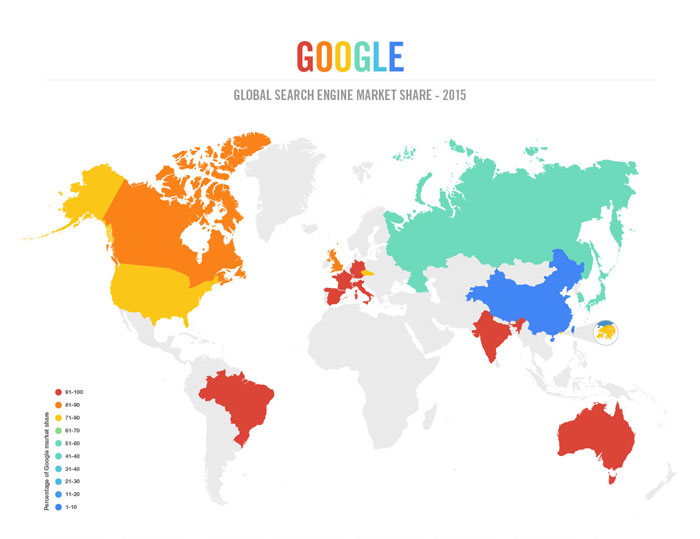The Changing Face of Search Engine Market Share

According to comScore, 2015 yielded Google’s lowest market share in five years. While Bing and Yahoo, at 20.7 and 12.7 percent respectively, aren’t close to matching Google’s 63.9 per cent, it does indicate that the search world is shifting.
Some of these market share changes can be attributed to factors other than user choice. Currently, the default search engine on Mozilla Firefox is Yahoo, while Google is the default on Apple’s browser Safari. However, for iOS Siri searches, Apple devices use Bing by default. This muddies the waters around how to accurately gauge the search engine people prefer, as some people don’t know how to, or are simply disinclined to, change the settings to their preferred provider. With desktop browsing, searching is more deliberate as users tend to enter a URL to get their favourite search engine.
How Google will fare against the increasing competition
Many search engines have come and gone since the advent of the internet. Google’s big advantage is how entrenched it has become, not only as a business, but as a part of the cultural zeitgeist. People don’t Bing things or Yahoo things, they don’t even merely search things; they Google them. Even if they don’t use Google, it has entered the digital lexicon and keeps the company firmly in the driver’s seat. However, this doesn’t mean that they are insurmountable, with a world of options now open to users who take issue either with the Google user experience, or the invasive monopoly they have established. Bing and Yahoo are the two other major competitors, but there are many others available. The most popular include DuckDuckGo and Blekko, which promote themselves as “tracker-free”, Ask.com (which started life as Ask Jeeves), and the old-time favourite AOL.
Google’s market share depends on several factors. These include retaining default status on Safari, the continued popularity of their Chrome browser, and the growth of networks such as Facebook.

The integration of search functionality into social media platforms, and a range of other products that directly challenge the Google group, such as video and shopping, are likely the biggest threats to the Google way of life.
A change in the digital marketing landscape
The future of digital marketing is how to target the individual user. Google’s dominance has thus far made it a simple matter of optimising solely for one set of parameters – searching on Google. Marketers will have to be savvier in the future, and craft personalised campaigns that understand whether a user is on Bing, Yahoo, Google, or another search engine.
No longer will it be a black and white issue of being on page 1 or not; it will matter more with what engine you are on page 1, for which set of users. This will be the driving factor behind where and how PPC and SEO budgets are spent, leading to greater understanding of how people use and engage with technology from different demographics.
